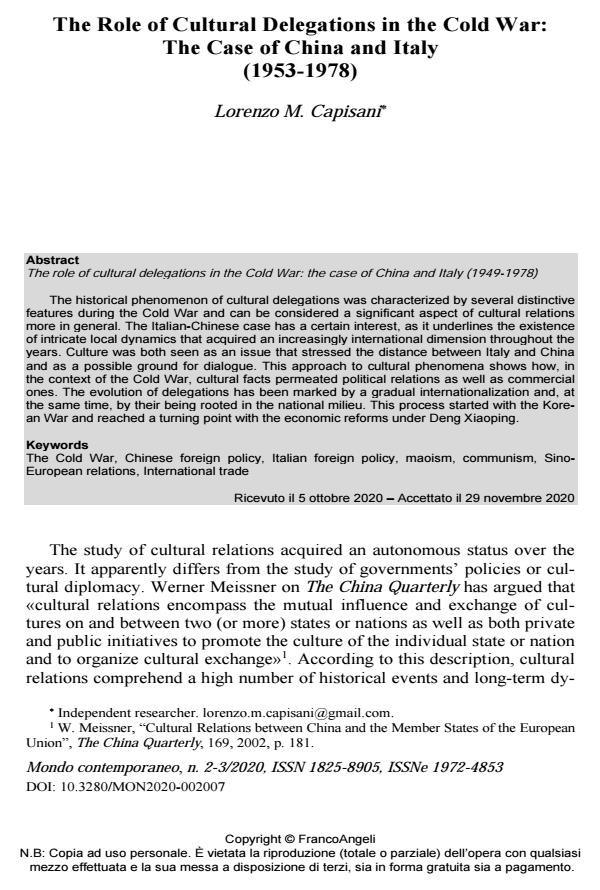The role of cultural delegations in the Cold War: the case of China and Italy (1949-1978)
Journal title MONDO CONTEMPORANEO
Author/s Lorenzo M. Capisani
Publishing Year 2021 Issue 2020/2-3
Language Italian Pages 30 P. 123-152 File size 429 KB
DOI 10.3280/MON2020-002007
DOI is like a bar code for intellectual property: to have more infomation
click here
Below, you can see the article first page
If you want to buy this article in PDF format, you can do it, following the instructions to buy download credits

FrancoAngeli is member of Publishers International Linking Association, Inc (PILA), a not-for-profit association which run the CrossRef service enabling links to and from online scholarly content.
The historical phenomenon of cultural delegations was characterized by several distinctive features during the Cold War and can be considered a significant aspect of cultural relations more in general. The Italian-Chinese case has a certain interest, as it underlines the existence of intricate local dynamics that acquired an increasingly in-ternational dimension throughout the years. Culture was both seen as an issue that stressed the distance between Italy and China and as a possible ground for dialogue. This approach to cultural phenomena shows how, in the context of the Cold War, cul-tural facts permeated political relations as well as commercial ones. The evolution of delegations has been marked by a gradual internationalization and, at the same time, by their being rooted in the national milieu. This process started with the Korean War and reached a turning point with the economic reforms under Deng Xiaoping.
Il fenomeno storico delle delegazioni culturali ha assunto caratteristiche particolari durante la Guerra Fredda e rappresenta un aspetto significativo delle relazioni culturali in generale. Il caso italo-cinese riveste un certo interesse poiché mostra l’esistenza di dinamiche complesse a livello locale che, col tempo, hanno assunto una dimensione sempre più internazionale. In questi anni, la cultura è stata intesa come un fattore di distanza e, al contempo, di possibile dialogo. Questa accezione ampia evidenzia come, nel contesto della Guerra Fredda, l’ambito culturale permeasse anche le relazioni politiche e quelle commerciali. L’evoluzione delle delegazioni è stata segnata da una progressiva internazionalizzazione e, al contempo, da un radicamento nel contesto nazionale. Tale processo si è sviluppato a partire dalla guerra di Corea e ha raggiunto un punto di svolta con le riforme economiche di Deng Xiaoping.
Keywords: The Cold War, Chinese foreign policy, Italian foreign policy, maoism, communism, Sino-European relations, International trade
Lorenzo M. Capisani, The Role of Cultural Delegations in the Cold War: The Case of China and Italy (1953-1978) in "MONDO CONTEMPORANEO" 2-3/2020, pp 123-152, DOI: 10.3280/MON2020-002007